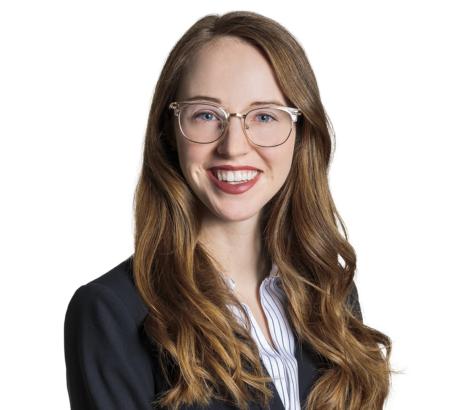Sustainability, social movements, and the law are rarely in the same sentence, but two-time Capital graduate Emma Mulvaney, J.D., often finds that her career as a lawyer requires her to navigate all three.
Early in her college career, Mulvaney was listed as an undecided major and was unsure of what she wanted to do with her life. A few years later, she earned her B.A. in Spanish and then continued her education by earning her J.D. at Capital University Law School in 2020. In January 2022, Mulvaney celebrated her first anniversary as a full-time Public Finance and Real Estate Attorney with Frost Brown Todd.
During her first year as a practicing attorney, Mulvaney worked to make her mark in the municipal finance world. A focus area she didn’t even know existed a few short years ago, Mulvaney’s practice focuses on assisting municipalities, school districts, and other public and private entities in various financial matters, including bond issuances, economic development, special project financing, and real estate acquisition.
“It’s a lot of helping finance public infrastructure, so like a school building,” Mulvaney said. “When we write a contract, we are working to prevent litigation, and I enjoy that. Especially when you’re working with a bank in a school district to fund something like school buses. Everyone wants to accomplish this for the school district. The transaction is more cooperative, and I appreciate that environment.”
With a minor in environmental science, Mulvaney was prepared to dive into a type of investing that is quickly gaining popularity, Environmental, Social and Governance (ESG).
“I will say that kind of popularity of environmental, social governance and even green investing fits very well with my background. There’s a rise in interest, and I think it may be because millennials are reaching an age where they are starting to invest,” said Mulvaney.
Investors want to see positive returns, but that doesn’t strictly mean a good return with an interest rate.
“Now that climate change is at the forefront of people’s minds and with Black Lives Matter, a lot of things have changed about how we approach our diversity, equity and inclusion,” said Mulvaney. “That’s part of our social structure and could impact the municipality, which could impact the community. That could impact whether or not you’re able to pay your debt. It all comes back to money, and these things have tangible connections to the world today.”
Pursuing a law degree wasn’t always part of Mulvaney’s life plan. Attending Capital University Law School as a part-time, evening student allowed her to “dip [her] foot into law school without quitting [her] full-time job.” She later transitioned to a full-time, traditional student.
“I don’t know if I ever saw it as attainable because of how expensive law school can be,” said Mulvaney. “Capital has night programs, which were really appealing for me, because I did not want to be in debt. That was a huge concern when I was looking at grad schools.”
As a law student, Mulvaney found herself in diverse classrooms with people that would soon become her friends, colleagues, and fellow Capital alumni.
“As an evening student, I will note that everyone comes with very different backgrounds. During class, I really felt enriched because of those life experiences and perspectives,” said Mulvaney. “Generally, with Capital, the people make the difference.”
To learn more about Capital University Law School, go to http://law.aksarayyeralticarsisi.com/.
